Every year, an estimated 1,000 bicyclists die and over 130,000 are injured in crashes that occur on US roads. With that in mind, Velo.AI is hoping to make biking safer with an AI-powered bike light called the Copilot.
While the concept of a bike light itself isn’t new, what will make the Copilot stand apart, according to the Hazelwood Green-based company’s Clark Haynes, is that due to its smart sensors, the product could potentially reduce accidents by making cyclists aware of hazards on the road.
“Vehicles have been getting safer and safer for many decades,” the cofounder and CEO told Technical.ly. “So we’ve actually reversed course [and] a lot of this [Copilot technology] is really informed by bicyclists and bike commuters and recreational riders wanting to feel safer when they were out on our streets.”
Haynes, who comes from the world of autonomous vehicles (including time spent at Aurora and Uber) along with cofounder and CTO Micol Marchetti-Bowick, emphasized that the company’s focus is safety.
In addition to alerting cyclists about potential risks and hazards, the Copilot can also record video for data collection. This data, Haynes said, will hopefully become a way to bring attention to areas of the region with lacking infrastructure and inform policymaking and infrastructure decisions to make roads safer.

Velo.AI cofounder Clark Haynes. (Courtesy photo)
So far the company has between 20 and 30 cyclists testing the Copilot in Pittsburgh who are gathering a great deal of data for the company. But with roughly 500 people on their waiting list, Haynes, Marchetti-Bowick and Chief of Staff Alison Treaster feel this technology is something the cyclist community has been craving.
“One of our beta testers put it really well. He said, ‘I would love to walk out of the house and not have to wear a helmet and not have to have all this gear on my bike, but the fact of the matter is that I don’t feel safe, being on the streets without those,’” Treaster said. “‘So having Copilot with me is something that I want to use and have, you know, as part of my arsenal so that I can commute and ride my bike recreationally and things like that.’”
Currently, Haynes, Marchetti-Bowick and Treaster are Velo’s only three full-time employees. Additionally, Haynes said the company employs two contractors who assist with hardware and software. Most of the company’s focus is on artificial intelligence and machine learning in addition to getting the product out there and testing it with people.

Velo.AI cofounder and CTO Micol Marchetti-Bowick. (Courtesy photo)
“Modern automobiles come with a whole host of safety features far beyond just airbags and crumple zones and roll cages … and a lot of what our company is doing is bringing tech that kind of shares its DNA with that kind of autonomy-focused car tech,” Haynes said. “But we’re deploying it for bicycles.”
In the way of funding, so far Velo has received an investment of an undisclosed amount from the Richard King Mellon Foundation’s social impact fund, and Haynes said the company plans to seek out funding from traditional venture sources. The CEO recently pitched the company during the AI & Robotics Venture Fair during Xchange Innovation Week.
The ultimate goal is that one day, the roads will be so safe for cyclists that technology solutions like Copilot won’t be necessary.
“I think the end game for us is we would love to not have to exist as a company,” Treaster said. “The fact of the matter is that they’re not safe enough and so we want to be able to leverage technology to make streets safer.”
Atiya Irvin-Mitchell is a 2022-2024 corps member for Report for America, an initiative of The Groundtruth Project that pairs young journalists with local newsrooms. This position is supported by the Heinz Endowments.Before you go...
Please consider supporting Technical.ly to keep our independent journalism strong. Unlike most business-focused media outlets, we don’t have a paywall. Instead, we count on your personal and organizational support.
Join our growing Slack community
Join 5,000 tech professionals and entrepreneurs in our community Slack today!

The person charged in the UnitedHealthcare CEO shooting had a ton of tech connections

From rejection to innovation: How I built a tool to beat AI hiring algorithms at their own game

The looming TikTok ban doesn’t strike financial fear into the hearts of creators — it’s community they’re worried about


